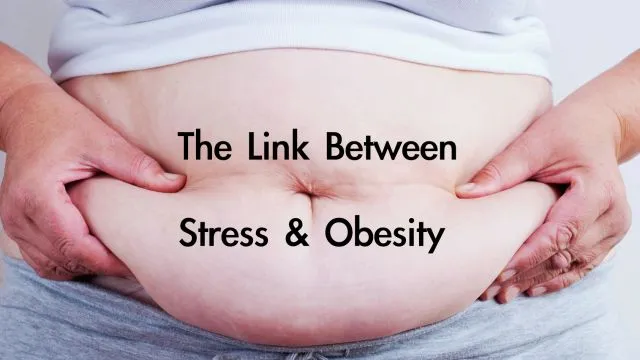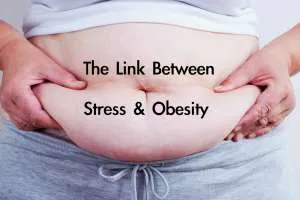
- Share on Facebook79
- Share on Pinterest
- Share on Twitter
We live in a country where obesity rates are rapidly — and worryingly — rising, in both adults and children. At the same time, our stress levels are through the roof! With so many people working overtime, commuting to work on congested highways, and juggling several jobs just to stay afloat — on top of all the regular life stressors that come our way — it can be hard to relax.
However, relaxation and stress management is vitally important, not only for your sanity and mental health, but for your physical health as well. One serious physical consequence of chronic stress is the potential for weight gain. And gaining too much weight, as we all know, comes with its own host of problems.
There is a body of research linking stress to weight gain and obesity, and new studies do not paint a much brighter picture.
A troubling new study
New research out of the University of Houston Department of Health and Human Performance (HHP) and Texas Obesity Research Center (TORC) has found troubling implications for chronic stress in children.
For this study, researchers analyzed the data of over 4,700 teenagers born between the years of 1975 and 1990, and examined three separate “family stress points” against their data. The “stress points” were financial stress, disruption within the family, and a mother’s poor health. They then set this data against whether or not a specific teenager was obese by the time they were 18 years of age.
On their results, the study authors wrote:
“The accumulation of family disruption and conflict and financial stress was positively related to female adolescents being overweight/obese. Childhood exposure to maternal risky health behaviors was positively associated with higher weight status for male adolescents. Total cumulative stress was related to overweight/obesity for females, but not males.”
Further extrapolating on the study results, study leader Daphne Hernandez stated, “Overall, the findings suggest that female and male adolescents respond differently to stress. This study extends our knowledge of stress and obesity by focusing on the family environment over time.”
Hernandez added, “Developing strategies to help with family stressors during childhood may help children maintain healthy weight into adulthood.”
Other research regarding stress and obesity
Past research has also found a troubling connection between various types of stress and obesity. A 2014 study published in the journal Obesity surveyed just over 5,000 participants for five years, and analyzed the relationship between their body mass index (BMI) and their stress levels.
Based on their analysis, the authors concluded:
“Psychosocial stress, including both perceived stress and life events stress, was positively associated with weight gain but not weight loss. These associations varied by age, smoking, obesity, and multiple sources of stressors.”
The authors of another study, published in 2010 in the journal Trends in Endocrinology and Metabolism, sought to explain the connection between a stressed mindset and overeating. They wrote:
“Stressors, by activating a neural stress-response network, bias cognition toward increased emotional activity and degraded executive function. This causes formed habits to be used rather than a cognitive appraisal of responses. Stress also induces secretion of glucocorticoids, which increases motivation for food, and insulin, which promotes food intake and obesity. Pleasurable feeding then reduces activity in the stress-response network, reinforcing the feeding habit.”
In other words, according to this study, the more stressed we are, the more likely we are to overeat, due to both the pleasure that we derive from food intake, and from sheer force of habit, which kicks into overdrive as our minds are less able to make an executive decision to stop ourselves.
The stress/obesity connection
So, how does stress lead to overeating in the first place? One factor is serotonin, the “feel good” hormone of the body. Lowered levels of serotonin, which occur during stress, may lead to cravings for carbohydrates, as carbs temporarily spike serotonin levels.
However, this can be a vicious cycle, since some carbs, especially unhealthy carbs, such as refined flour and sugar, are addictive and may cause inflammation, further raising your risk of weight gain.
The urge to overeat, or to eat emotionally, is not the only way in which stress can lead to obesity. Some of the body’s hormones can fluctuate due to the onset of stress. An important one is cortisol, sometimes casually referred to as the “stress hormone.”
When stress becomes chronic, the body begins to overproduce cortisol. Cortisol levels that are too high, over a long period of time, have been linked to the accumulation of belly fat. This type of fat is especially dangerous, as it tends to coat the body’s vital organs, and may be a catalyst in system-wide inflammation.
What’s worse is that belly fat itself may cause the body to release even more cortisol, leading to a self-perpetuating loop of both stress and weight gain.
Furthermore, chronic stress leads nerve cells to release a molecule known as neuropeptide Y, which actually promotes the accumulation of fat in the body.
Other dangers of stress
An increasing waistline is not the only danger of prolonged stress — not by a long shot. Just a few of the other dangers of stress include a higher susceptibility to the following:
- Psychological imbalances
- Insomnia
- Diabetes
- Depression
- Acne
- Heart disease
- Cancer
Stressors that you can control
 It goes without saying that some stress is unavoidable. Life is a roller coaster, and we all face situations that we do not expect, and cannot control. In short bursts, stress can even be healthy, as it can motivate us to act, or to change a situation for the better. However, getting lost in the cycle of perpetual stress is certainly unhealthy.
It goes without saying that some stress is unavoidable. Life is a roller coaster, and we all face situations that we do not expect, and cannot control. In short bursts, stress can even be healthy, as it can motivate us to act, or to change a situation for the better. However, getting lost in the cycle of perpetual stress is certainly unhealthy.
The good news is, there are many stressors in our lives that we DO have a lot of control over. For example, if you feel like you have no alone time to unwind, make a point to pencil it in! Treat it like you would a vitally important business meeting, and do not cancel unless it’s an absolute emergency!
If you are stressed because of your daily commute to work, you can try biking or carpooling instead. In extreme cases, a job change may even be something to consider — especially if your place of employment causes you undue and unending anxiety.
Another factor to consider is the time you spend staring at screens. Digital overload is a real thing, and it can lead to stress very easily. Try scheduling in some “no screen” time, and turning off your TV, iPad, and cell phone during these times.
Staying away from screens for at least an hour before you go to bed can help a lot too — as the blue light from the screen can make it difficult to sleep — and poor sleep can certainly aggravate your stress levels.
And a truly important one: your diet. If you are not eating right, you may be literally feeding your stress. Processed foods in particular are pumped full of additives, and many of these can alter your hormonal levels — which may lead to stress. Not eating enough is also harmful. When the body is hungry, the “starvation reaction” that you experience is stressful.
Change your lifestyle to minimize your stress
Fortunately, there are many healthy lifestyle habits that we can adopt in order to kick chronic stress to the curb. Try the following tips, and see if you find yourself feeling more at ease:
- Eat a healthy diet. Ditch the processed foods — yep, all of them — and focus on whole, nutritious foods, including plenty of fruits and vegetables. Be sure to drink lots of water!
- Exercise regularly. Working out can work wonders for lowering your stress levels. Try to get at least 20 minutes each day.
- Meditate. Even five minutes in the morning, and five minutes before you go to bed, can help a lot. As you get accustomed to this ancient and highly effective practice, you can lengthen the duration of your meditation sessions.
- Yoga. This is another time-tested tool to get you relaxed and feeling zen.
- Sleep. Your body needs at least seven hours — if not eight — each night. Make sure you provide it with these hours!
If, despite leading a healthy lifestyle and actively engaging in stress-relief practices, you still find your mind going haywire with anxiety, it may be time to talk to a counselor that you trust. This can help you get to the root of your stress and begin the healing process.
—The Alternative Daily
Sources:
http://www.uh.edu/news-events/stories/2015/April/46HHPStressObesity.php
http://www.sciencedirect.com/science/article/pii/S0091743515000158
http://www.ncbi.nlm.nih.gov/pubmed/23512679
http://www.ncbi.nlm.nih.gov/pubmed/19926299
http://www.mayoclinic.org/healthy-living/stress-management/expert-answers/stress/faq-20058497
https://www.thealternativedaily.com/5-minutes-of-meditation-reduces-your-risk-of-heart-attack
https://www.thealternativedaily.com/relieve-stress-with-walnuts
https://www.thealternativedaily.com/researchers-discover-exercise-can-alleviate-stress-related-depression
- Share on Facebook79
- Share on Pinterest
- Share on Twitter

